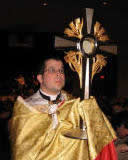|
Servants of the Pierced Hearts of Jesus and Mary-
Homilies |
"The Love of Christ:
The Source of Our Hope and Our Joy"
Homily for
the Sixth Sunday of Easter
Fr. Jonathan L. Reardon
29 May 2011
Year A
C.S. Lewis put is best when he said: “In the face of the
foolishness that contends that Jesus was a good man or a prophet
or a wise moral guide, but that He was only a man, that Jesus is
either God or a blasphemous liar.” Those who see Jesus in this
way use the Bible as their authority, but Lewis, and the
Christian Tradition, points out that that same Bible reveals
Jesus as God: He forgives sins, He “teaches with authority,” He
raises the dead, walks on water, and so on. The New Testament
was written around that which we celebrate in this Easter Season
– the fact of the Resurrection of Jesus Christ from the dead.
But for many, faith is a challenge and there is a struggle to
believe, practice and love.
As Catholics, I suspect that many of us have a “have to do”
mentality toward faith and religion. “I have to go to Mass, I
have to do penance, I have to contribute to the collection,” and
so on. This attitude also spills over into our daily routine: “I
have to help the kids with homework, I have to do the laundry, I
have to make dinner,” and so forth. With this attitude we
recognize our obligations, duties and responsibilities that are
indeed necessary. It may sometimes seem difficult to perceive
immediately but I’m sure most of us would agree that in our
daily lives we do these things for family and friends because we
not only have responsibilities but also because we love them.
With regard to faith and religion the next is – the “I get to”
stage. “I get to go to Mass, I get to pray, I get to share the
goodness of God with others.” In this stage, certainly we are
aware of our obligations toward God but the question we can ask
ourselves is this: do I practice these things because “I have
to” or out of love, with a firmly rooted belief in Him, a sense
of gratitude toward God and a desire to be with Him in heaven
for all eternity?
Two out of four statements
on the fruits of loving or not loving Jesus hold this section of
St. John’s Gospel together with love as the central theme. The
disciples are faced with ensuing departure of their master and
the challenge of abiding in Him, remaining in His love. Jesus
assures them, by speaking of the sending of the Spirit – another
Counselor or Advocate – that He will be the one to defend them,
help them in their struggle, and console them in times of
distress. His going away will not produce a situation of
“lostness” but a new era gifted with the Spirit, marked by love,
the keeping of the commandments of Jesus, and the promise of a
future time when the Father and the Son will abide forever with
the disciple. This is the promise of Jesus that we hear in this
Gospel: He will never abandon His closest friends. He speaks
quite tenderly to them, reminding them how they are to remain
close to Him – by loving Him and keeping the commandments. Their
longing to be with Jesus, to remain with Him is what fueled
their love for Him and led them to bear witness to Him in the
world.
Our love for God is something we ought to reflect upon
frequently. We could ask ourselves: do we love God? Are we in
love with Him? It is a fallacy to suppose that simply by
observing the commandments, practicing and carrying out the
teachings of the Church that this is evidence of love for a
person’s motivation for doing so could be altogether different.
It is essential to carry out and practice the commandments, as
Dominican Fr. Gerald Vann reminds us, but to do so “in such a
way that we learn to see more clearly our true center, to keep
our eyes more and more on God and less and less on ourselves.”
When we are able to keep the commandments in this way, keeping
our focus, our attention and our eyes fixed on being with Jesus
then do we begin to really love Him.
But how do we keep our attention focused on Him? By fostering
within our hearts a true desire for heaven. Here, we are
reflecting upon the vision of Christ – seeing Him face to face
and the love that awaits us in eternity. This is what it means
to hope, to live in the expectation of the promise of heaven. By
living this hope, we begin to see more clearly in our daily
lives the road that leads to heaven – greater faithfulness to
Christ, living the commandments in such a way that is reflected
in our daily actions because it reveals our inner love for God.
This is what St. Peter means when he says: “Sanctify Christ as
Lord in your hearts.” And this will be our great joy.
